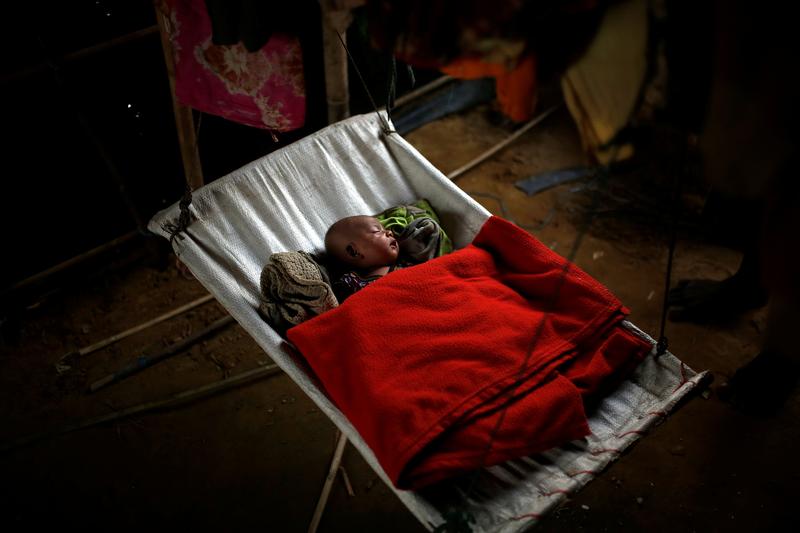COX’S BAZAR, Bangladesh — With her 16-day-old son lying asleep in her lap, tears streamed down the face of a 20-year-old Rohingya refugee in Bangladesh as she accused Burmese troops of covering her eyes and mouth and raping her, before making her watch as they killed her husband.
“I don’t know if this baby is from my husband or the rape,” said the woman, speaking through a translator, during a visit by United Nations Security Council envoys to camps in Cox’s Bazar in Bangladesh sheltering nearly a million refugees.
Ahead of the council visit to Bangladesh and Burma last week, senior UN officials warned the envoys about the prospect of a flood of babies being born in the coming weeks and months in the refugee camps that could be the result of rape.
In a joint statement, UN envoy for sexual violence in conflict, Pramila Patten, and UN assistant secretary-general for human rights Andrew Gilmour wrote “reports suggest Rohingya women and girls were raped on a systematic and possibly massive scale.”
“Many of the women and girls raped in 2017 are due to give birth in the next few weeks, during the monsoon season, and we are concerned that many will not be able to access medical care to give birth safely,” they wrote.
Nearly 700,000 mainly Rohingya Muslims fled to Bangladesh in the past eight months following a Burmese military crackdown that the United Nations, United States and Britain have denounced as ethnic cleansing. Burma denies ethnic cleansing.
In March the United Nations launched an appeal for $951 million to help the Rohingya refugees for the rest of the year, but the world body said at the end of April it was only 9 percent funded.
The United Nations and aid groups working in the refugee camps in Cox’s Bazar, Bangladesh, said that it was difficult to know exactly how many women and girls were pregnant. It was even more difficult to know how many of the pregnancies were the result of rape.
“With the help of the UN bodies and other international and national [aid groups], we are trying to identify the pregnant women so that they get proper treatment,” said a senior Bangladesh health ministry official, who declined to be named due to sensitivity of the matter.
He said that so far 18,300 pregnant women had been identified and the rough total estimate was around 25,000.
[related]
Rohingya insurgent attacks on security posts in Burma’s Rakhine State in August sparked a military operation that Burma described as a legitimate response. Fleeing refugees have reported killings, rapes and arson on a large scale.
“Based on UN reports and testimonies from Rohingya women who told our staff of rape and sexual violence in Myanmar, we do sadly expect the number of babies born as a result of unwarranted pregnancies to increase in the coming months,” said Daphnee Cook, Save the Children’s spokeswoman in Cox’s Bazar.
UN Secretary-General Antonio Guterres recently blacklisted the Burmese armed forces in his annual report on conflict-related sexual violence. The military must now decide whether to work with Patten on a plan that would lead to their removal from the blacklist.
During a two-hour meeting with Security Council envoys in Burma’s capital Naypyidaw last week, military chief Min Aung Hlaing vowed “harsh action” over sexual violence. According to the state-run Global New Light of Myanmar newspaper, he said: “Sexual violence [is] considered as despicable acts.”
Last November, Burma’s military release a report denying all accusations of rape by security forces.
Melissa How, Médecins Sans Frontieres (MSF) medical coordinator in Cox’s Bazar, said he had seen “a number of women and girls” who had become pregnant from sexual violence in Burma or Bangladesh.
“Some have miscarried; some have turned to traditional medicine and other methods to end their pregnancies, using unsafe methods. A number of women and girls have chosen to access MSF facilities for medical care, as well as menstrual regulation, in Bangladesh,” she said.
Abortion is illegal in Bangladesh but menstrual regulation to terminate a pregnancy is permissible. How also added that the majority of women in the camps who give birth do so outside health facilities.
Burma and Bangladesh agreed in January to complete the voluntary repatriation of the refugees within two years but the deal poses a challenge for women who give birth to children born from cases of rape.
UN envoy Patten, who will visit Cox’s Bazar this month, said complying with a requirement in the deal for women to go the Bangladesh Supreme Court to obtain a document noting that a child had been “born out of unwarranted incidence,” a reference to cases of rape resulting in pregnancy, may be too difficult for poor, illiterate women.



